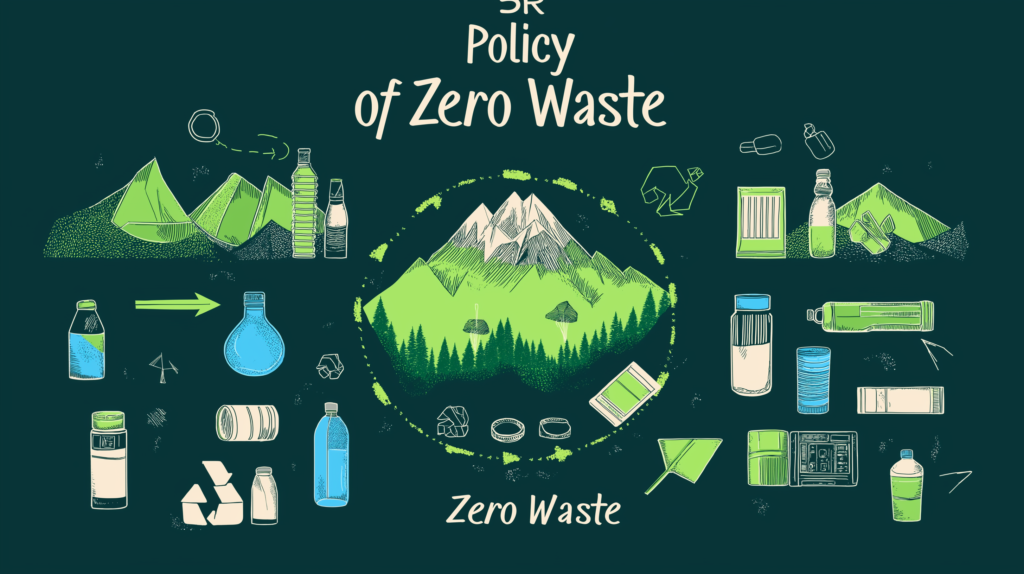Every year, the world produces over 2 billion tons of solid waste—a mind-boggling amount. It’s hard to even wrap your head around that number, isn’t it? To put it in a way we can all understand, that’s enough trash to fill more than 800,000 Olympic-sized swimming pools! Or, imagine this: it’s enough garbage to cover the entire state of Rhode Island…several times over. Think about that for a moment.
And of all this waste, plastic is one of the biggest problems. Millions of tons of it end up in our oceans each year, where it can be a death sentence for marine life. We’ve all seen the heartbreaking images of turtles tangled in plastic or whales with stomachs full of trash. It’s truly devastating.
But the impact goes far beyond the oceans. This massive amount of trash affects everything. It pollutes the air we breathe and the water we drink. It harms the animals and plants we share this planet with. It takes up valuable space that could be used for other things. And it puts a huge strain on our waste systems, with landfills overflowing and releasing harmful methane gas, and plastic debris clogging our waterways and creating environmental nightmares.
It can feel overwhelming, like there’s nothing we can do. But the good news is, that’s not true! We can make a difference. Adopting a zero-waste lifestyle isn’t about being perfect; it’s about making small, meaningful changes in our daily lives. Every time we choose a reusable bag over a plastic one, every time we compost a banana peel instead of throwing it away, every time we make a mindful purchase, we’re making a positive impact. Because when it comes to protecting our planet, every single action matters. We’re all in this together, and even the smallest changes can add up to something big.

What is a Zero Waste Lifestyle?
A zero-waste lifestyle is more than just a trend; it’s a conscious commitment to minimizing our environmental impact by drastically reducing the waste we produce. It’s about rethinking our relationship with consumption and embracing a circular economy where resources are valued and waste is minimized. This approach centers around five core principles, often referred to as the 5Rs:
- REFUSE: This is the cornerstone of a zero-waste lifestyle. It’s about consciously avoiding unnecessary items, particularly single-use plastics. Consider this: globally, we produce over 300 million tons of plastic every year, and a significant portion of that is single-use items destined for landfills or our oceans. By refusing these unnecessary extras – the plastic straws, the disposable coffee cups, the excess packaging – we can significantly reduce our plastic footprint. It’s about asking ourselves, “Do I really need this?” before accepting something we don’t.
- REDUCE: Once we’ve refused the unnecessary, we move on to reducing our consumption overall. This involves being mindful of our needs versus our wants and making conscious choices to buy less. A staggering 40% of food produced for human consumption is wasted globally. By reducing our food waste, we not only save money but also lessen the environmental impact of food production and disposal. Reducing also means choosing products with minimal packaging, supporting companies with sustainable practices, and repairing items instead of replacing them.
- REUSE: This is where creativity and resourcefulness come into play. Instead of discarding items, we find new purposes for them. Think about repurposing glass jars for storage, using old t-shirts as cleaning rags, or bringing your own containers for takeout food. The possibilities are endless! Reusing extends the lifespan of products, reduces the demand for new resources, and minimizes waste sent to landfills. For example, switching to reusable water bottles can eliminate hundreds of single-use plastic bottles per year.
- RECYCLE: Recycling is a crucial part of waste management, but it’s important to remember that it’s the fourth R. While recycling diverts materials from landfills, it still requires energy and resources. It’s essential to know your local recycling guidelines and ensure you’re sorting materials correctly. Globally, only about 9% of all plastic ever produced has been recycled. This highlights the importance of focusing on the first three Rs (refuse, reduce, reuse) to minimize the amount of material that needs to be recycled in the first place.
- ROT (Compost): Composting is nature’s way of recycling. By composting food scraps, yard waste, and other organic materials, we can create nutrient-rich soil for gardening. This reduces the amount of organic waste sent to landfills, where it decomposes and releases methane, a potent greenhouse gas. In the United States, food waste accounts for approximately 22% of municipal solid waste sent to landfills. Composting not only reduces this waste but also enriches the soil, reducing the need for chemical fertilizers.

The overarching goal of a zero-waste lifestyle is to minimize the amount of waste sent to landfills and incinerators. It’s about creating a closed-loop system where resources are used responsibly and waste is minimized at every stage. It’s a journey, not a destination, and every effort, no matter how small, makes a difference.
How Zero Waste Contributes to a Pollution-Free Planet
The zero-waste lifestyle offers a powerful antidote to the growing pollution crisis. By embracing its core principles, we can collectively contribute to a healthier planet.
- Reduction in Plastic Pollution:
- Single-use plastics are one of the largest contributors to pollution. Globally, we generate over 300 million tons of plastic annually, with an estimated 8 million tons ending up in our oceans each year. This plastic debris entangles marine life, disrupts ecosystems, and breaks down into microplastics that can contaminate the food chain.
- Example: Using cloth shopping bags instead of plastic ones.
- Less Landfill Waste:
- Landfills are a significant source of greenhouse gas emissions. Decomposing organic waste in landfills produces methane, a greenhouse gas 25 times more potent than carbon dioxide. In the US, food waste alone accounts for roughly 22% of municipal solid waste sent to landfills.
- Example: Composting food scraps reduces organic waste in landfills.
- Conservation of Resources:
- Our planet’s resources are finite. The extraction and processing of raw materials for new products have a significant environmental footprint, consuming vast amounts of energy and water. Zero-waste emphasizes repairing, repurposing, and buying second-hand, reducing the demand for these resources.
- Example: Buying second-hand clothes or furniture instead of new ones. For instance, the fashion industry is a major consumer of water; choosing second-hand clothing reduces the need for water-intensive textile production.
- Cleaner Air and Water:
- Reducing waste directly translates to less pollution. Fewer industrial processes mean less air pollution from manufacturing. Furthermore, opting for natural cleaning products over chemical-laden ones prevents harmful substances from entering our waterways.
- Example: Using eco friendly products prevents chemical runoff into water systems.
- Promotes Circular Economy:
- Our current “take-make-dispose” economic model is unsustainable. Zero-waste champions a circular economy where resources are kept in use for as long as possible, extracting the maximum value from them whilst in use, then recovering and regenerating products and materials at the end of each service1 life. This closed-loop system minimizes waste, reduces resource depletion, and fosters innovation in sustainable product design. It encourages businesses to prioritize durability, repairability, and recyclability, shifting away from a culture of planned obsolescence.
Simple Steps to Adopt a Zero Waste Lifestyle
Embarking on a zero-waste journey can seem daunting, but it doesn’t have to be. It’s about making gradual changes and incorporating sustainable practices into your daily routine. Here are some simple yet impactful steps you can take:
Switch to Reusables: Ditch the disposables! This is one of the easiest and most effective ways to reduce your waste. Swap single-use plastics for reusable alternatives.
- Water Bottles: Invest in a high-quality stainless steel or glass water bottle and carry it with you everywhere. This simple switch can eliminate hundreds of plastic bottles from ending up in landfills each year.
- Utensils: Carry a set of bamboo or stainless steel utensils so you can say no to disposable cutlery when you’re eating out or getting takeout.
- Shopping Bags: Keep a stash of reusable shopping bags (cloth, canvas, or even sturdy reusable plastic) in your car or by the door so you’re always prepared for grocery shopping.
- Food Containers: Bring your own containers for takeout food or leftovers. This also helps reduce your reliance on disposable containers.
- Coffee Cups: Invest in a reusable coffee cup or travel mug and bring it to your favorite coffee shop. Many cafes even offer discounts for bringing your own cup!
- Napkins: Swap paper napkins for cloth napkins. They’re more elegant and can be washed and reused countless times.
Shop Mindfully: Being a conscious consumer is key to a zero-waste lifestyle.
- Buy in Bulk: Reduce packaging waste by buying products in bulk whenever possible. Look for stores that offer bulk bins for items like grains, nuts, and spices.
- Support Sustainable Brands: Choose to support companies that prioritize sustainability and ethical practices. Look for brands that use eco-friendly packaging, offer refill options, and are transparent about their supply chains. Research B Corps – these businesses meet high standards of social and environmental performance, accountability, and transparency.
- Plan Your Meals: Planning your meals ahead of time helps you avoid impulse purchases and reduces food waste. Make a shopping list and stick to it.
Start Composting: Composting is a fantastic way to reduce organic waste and create nutrient-rich soil for your garden.
- Set Up a Compost Bin: You can compost in your backyard or even in a small container on your balcony. There are many resources available online to help you get started with composting.
- Compost Food Scraps: Compost fruit and vegetable scraps, coffee grounds, eggshells, and yard waste. Avoid composting meat, dairy, and oily foods.
DIY Alternatives: Making your own cleaning and personal care products is a great way to reduce waste and avoid harmful chemicals.
- Natural Cleaning Products: Many common household cleaners can be easily made at home using natural ingredients like vinegar, baking soda, and lemon juice.
- DIY Beauty Products: Explore making your own beauty products like lotions, scrubs, and deodorants using natural and sustainable ingredients. There are tons of recipes available online.
Opt for Minimalism: A minimalist lifestyle often goes hand-in-hand with zero waste.
- Quality over Quantity: Focus on buying fewer, higher-quality items that will last longer. This reduces the need for frequent replacements and minimizes waste.
- Declutter Regularly: Regularly declutter your home and donate or recycle items you no longer need. This helps prevent things from ending up in landfills.
By taking these simple steps, you can significantly reduce your environmental footprint and contribute to a more sustainable future. Remember, it’s a journey, and every small change makes a difference.
Benefits of Zero Waste Living
Adopting a zero-waste lifestyle isn’t just good for the planet; it’s good for you too! It’s a win-win situation, offering a multitude of environmental, personal, and community benefits.
Environmental Benefits:
- Reduced Pollution: Less waste means less pollution. Imagine: if everyone switched to reusable water bottles, we could drastically reduce the millions of plastic bottles that end up in landfills and oceans every year. Plastic takes hundreds of years to decompose, leaching harmful chemicals into the environment. Zero waste helps prevent this.
- Resource Conservation: We live on a planet with finite resources. Zero waste emphasizes reusing and repairing, reducing the demand for new raw materials. The fashion industry, for example, is a massive consumer of water and other resources; choosing second-hand clothing helps conserve these precious resources.
- Protection of Ecosystems: Pollution disrupts delicate ecosystems. Zero waste helps protect these vital systems by reducing the amount of harmful waste entering our environment. Coral reefs, for instance, are extremely sensitive to pollution, and reducing plastic waste is crucial for their survival.
- Reduced Greenhouse Gas Emissions: Landfills are a significant source of methane, a greenhouse gas far more potent than carbon dioxide. Reducing landfill waste through composting and other zero-waste practices helps mitigate climate change. Food waste alone contributes significantly to methane emissions.
Personal Benefits:
- Saves Money: Reducing consumption and buying only what you need can significantly lighten your wallet. Think about it: switching to reusable coffee cups could save you hundreds of dollars a year! Plus, DIY cleaning products are often much cheaper than store-bought ones.
- Improved Health: Single-use plastics can contain harmful chemicals that leach into food and drinks. By reducing your reliance on plastics, you can minimize your exposure to these potentially harmful substances. Making your own cleaning products also allows you to control the ingredients and avoid toxins.
- Simplifies Life: A minimalist approach, often associated with zero waste, can declutter your home and simplify your life. Less clutter equals less stress and more free time!
- Increased Awareness: The zero-waste journey cultivates greater awareness of your consumption habits and their impact. This mindful awareness can lead to more intentional and fulfilling living.
- Sense of Purpose: Knowing you’re making a positive difference can bring a profound sense of purpose and satisfaction.
Community Benefits:
- Stronger Communities: Zero waste initiatives often bring communities together through resource sharing, local business support, and environmental action.
- Local Economic Growth: Supporting local businesses that prioritize sustainability boosts the local economy and creates jobs.
- Reduced Burden on Waste Management Systems: Less waste means less strain on already overburdened waste management systems, saving taxpayer dollars.
Embracing a zero-waste lifestyle is an investment in a healthier future – for ourselves, our communities, and our planet. It’s a journey worth taking, and every step counts.
Conclusion
Zero waste is more than a lifestyle; it’s a necessity. It’s a call to action to protect our planet from the devastating effects of pollution. By embracing the principles of refuse, reduce, reuse, recycle, and rot, we can create a cleaner, healthier, and more sustainable future for all. Choose zero waste. Choose the planet.





